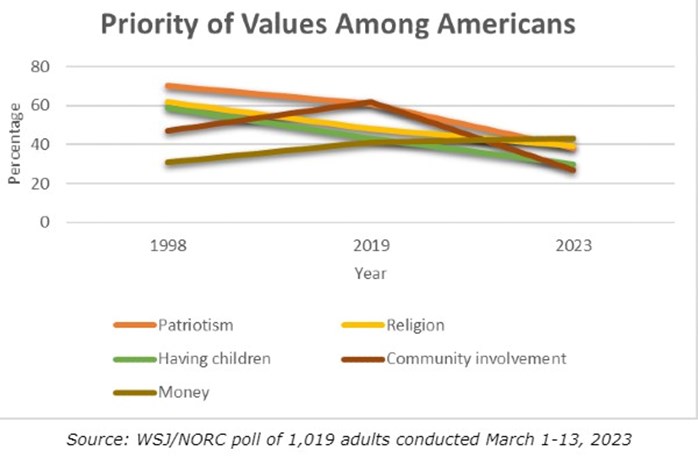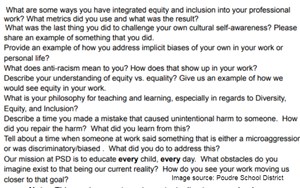 |
In our time, millions of Americans have shed many traditional values, including religious faith. FoxNews.com reports, "The importance of traditional American values has plummeted in the U.S. in recent decades, according to a new poll from The Wall Street Journal…. The poll found that just 39% of Americans say their religious faith is very important to them."
In contrast to 39% of Americans today saying that religious faith is important to them, in 1998, the WSJ noted that that percentage was 62% (see chart above). Along with this drop in professed religious faith is a drop in the belief that there is such a thing as absolute truth. (See related article)
But the founders of America affirmed that there is. In the Declaration of Independence, they declared, "We hold these truths to be self-evident…" "Self-evident truth? Well, maybe that was their truth," someone today might opine, "but my truth is different."
At this time of year, hundreds of millions of professing Christians the world over celebrate Palm Sunday, which initiates Holy Week – including Good Friday, and above all, Easter, the day Jesus walked out of His own tomb and changed history forever.
When He stood trial before the Roman procurator Pontius Pilate, Jesus said very little. Like a lamb to the slaughter, predicted Isaiah the prophet some 750 years earlier, He would open not His mouth.
However, He did mention that He came to "bear witness to the truth." Pilate sneered, "What is truth?" Then he walked away, as he tried to weasel his way out of having to deal with this unusual Defendant.
To the Christian, standing before Pilate was Truth Incarnate. Jesus had told His disciples just hours before this, "I am … the truth."
But Pilate was blind to this reality. In many ways, Pontius Pilate is like a modern man – not believing that there is such a thing as truth at all.
Dr. Jeff Myers, president of Summit Ministries and author of the book, Truth Changes Everything, writes: "America has passed a tipping point. A majority of young Americans now say that there is no absolute truth, rather it is up to each individual to define their own truth. People talk about 'speaking my truth' rather than 'seeking the Truth.'"
I have spoken with Myers a few times on the radio about this whole idea of absolute truth. He told me, "This is, I believe, the core issue of our day. Will we stand for truth or not? Will we even recognize that truth actually exists or will we persist in this fiction that truth is up to every individual?"
For centuries people have spoken of "the Gospel truth." There is a reason for this phrase. The Gospel refers to the Good News of the coming of Jesus Christ into our world, ultimately to save sinners through His death on behalf of others. Through faith in Him comes forgiveness and reconciliation to God and to our fellow man.
The recorded highlights of Christ's world-changing life were written down in the first century in the four biblical Gospels: Matthew, Mark, Luke, and John. But alas, there are those around who question the historical reliability of these sources.
Dr. Paul L. Maier, Ph.D., a Harvard-trained historian and bestselling author, is a retired professor of ancient history at Western Michigan University. In a television interview, he told me, "It seems that today there's one attack after another on the reliability of the New Testament in general or the Old Testament and the Gospels in particular. Now these are four mini-biographies of Jesus Christ, as you well know, but they are immensely reliable when you compare their evidence with the evidence we have outside scripture from the ancient world."
How so? Maier continued: "We find some of the same people and places and events that are mentioned inside the Bible, mentioned also in secular records, pagan records outside of the Bible – and for a historian this is a remarkable demonstration that the sources that we have inside of Scripture are very reliable indeed."
Dr. Sam Lamerson, one of my professors at Knox Theological Seminary, where I earned my doctorate of ministry, notes: "The biblical Gospels are far more trustworthy than most people realize. They think that they're myth, but in truth what we have are historically verifiable events that happened 2,000 years ago that were written down very close to the time that they happened and that were preserved in over 5,000 manuscripts that we have today."
Our ultimate solution to get back to truth is to get back to Jesus, notes Dr. Myers, who says: "If we can understand how Truth really did change everything in the past, then we can more clearly see what we lose in abandoning it and what we could gain by reclaiming it."
Truth is all that matters. Jesus is the Truth.
Notice: This column is printed with permission. Opinion pieces published by AFN.net are the sole responsibility of the article's author(s), or of the person(s) or organization(s) quoted therein, and do not necessarily represent those of the staff or management of, or advertisers who support the American Family News Network, AFN.net, our parent organization or its other affiliates.








